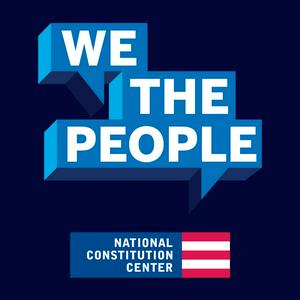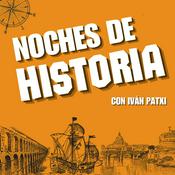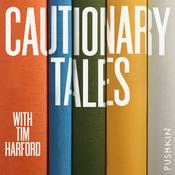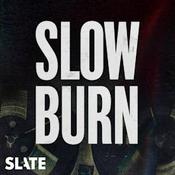605 Episoden
- Gary Berton, the president of The Thomas Paine Historical Association, joins Scott Cleary, co-editor of New Directions in Thomas Paine Studies and author of The Field of Imagination: Thomas Paine and Eighteenth-Century Poetry, to discuss the revolutionary life, ideas, and legacy of Thomas Paine in celebration of the 250th anniversary of his famous pamphlet, Common Sense. Julie Silverbrook, vice president of civic education of the National Constitution Center, moderates.
This conversation was originally streamed live as part of the NCC’s America’s Town Hall series on February 9, 2026. It is generously sponsored by Citizen Travelers, the nonpartisan civic engagement initiative of Travelers.
Resources
Scott Cleary, New Directions in Thomas Paine Studies
Scott Cleary, The Field of Imagination: Thomas Paine and Eighteenth-Century Poetry
Thomas Paine, Common Sense
Richard Rosenfeld, American Aurora: A Democratic-Republican Returns
Stay Connected and Learn More
Questions or comments about the show? Email us at [email protected]
Continue the conversation by following us on social media @ConstitutionCtr
Explore the America at 250 Civic Toolkit
Sign up to receive Constitution Weekly, our email roundup of constitutional news and debate
Subscribe, rate, and review wherever you listen
Join us for an upcoming live program or watch recordings on YouTube
Support our important work
Donate - In celebration of Black History Month, scholars Lucas Morel and Melvin Rogers join to discuss how African American leaders and citizens, such as Prince Hall, Frederick Douglass, Ida B. Wells, and Rev. Martin Luther King, Jr. have invoked the ideas and principles of the Declaration of Independence throughout American history to push for a more free and equal America. Thomas Donnelly, chief scholar of the National Constitution Center, moderates.
This conversation was originally streamed live as part of the NCC’s America’s Town Hall series on February 2, 2026.
Resources
National Constitution Center, "The Declaration Across History" Primary Sources
Lucas Morel, Lincoln and the American Founding
Melvin Rogers, The Darkened Light of Faith: Race, Democracy, and Freedom in African American Political Thought
Stay Connected and Learn More
Questions or comments about the show? Email us at [email protected]
Continue the conversation by following us on social media @ConstitutionCtr
Explore the America at 250 Civic Toolkit
Explore Pursuit: The Founders’ Guide to Happiness
Sign up to receive Constitution Weekly, our email roundup of constitutional news and debate
Follow, rate, and review wherever you listen
Join us for an upcoming live program or watch recordings on YouTube
Support our important work
Donate - In this Best of 2025-episode, Best-selling author Michael Lewis discusses his new book, Who Is Government?: The Untold Story of Public Service. As Americans’ distrust in the government continues to grow, Lewis’ book examines how the government works, who works for it, and why their contributions continue to matter. Jeffrey Rosen, CEO Emeritus of the National Constitution Center, moderates.
This conversation was originally streamed live as part of the NCC’s America’s Town Hall series on March 26, 2025.
Resources
Michael Lewis, ed., Who Is Government? The Untold Story of Public Service (2025)
Michael Lewis, “The free‑living bureaucrat,” The Washington Post (March 2025)
Michael Lewis, “Directions to a journalistic gold mine,” The Washington Post (Nov. 2024)
Michael Lewis, The Premonition: A Pandemic Story (2022)
Michael Lewis, The Fifth Risk (2018)
CURE ID
Stay Connected and Learn More
Questions or comments about the show? Email us at [email protected]
Continue the conversation by following us on social media @ConstitutionCtr
Explore the America at 250 Civic Toolkit
Explore Pursuit: The Founders’ Guide to Happiness
Sign up to receive Constitution Weekly, our email roundup of constitutional news and debate
Follow, rate, and review wherever you listen
Join us for an upcoming live program or watch recordings on YouTube
Support our important work
Donate - This week, we explore the life of an influential and yet, often overlooked founder, James Wilson. Whose ideas and influence continue to shape current debates about popular sovereignty, constitutional structure, and democratic self-government.
Legal scholar William Ewald of the University of Pennsylvania and Jesse Wegman of the Brennan Center for Justice join to discuss Wegman’s new book, The Lost Founder: James Wilson and the Forgotten Fight for a People’s Constitution, which explores the life and legacy of this founder and Supreme Court justice. Julie Silverbrook, vice president of civic education of the National Constitution Center, moderates.
Resources
Jesse Wegman, The Lost Founder: James Wilson and the Forgotten Fight for a People's Constitution
Jesse Wegman, Let the People Pick the President: The Case for Abolishing the Electoral College
Stay Connected and Learn More
Questions or comments about the show? Email us at [email protected]
Continue the conversation by following us on social media @ConstitutionCtr
Explore the America at 250 Civic Toolkit
Explore Pursuit: The Founders’ Guide to Happiness
Sign up to receive Constitution Weekly, our email roundup of constitutional news and debate
Follow, rate, and review wherever you listen
Join us for an upcoming live program or watch recordings on YouTube
Support our important work:
Donate - After more than 12 years of distinguished service as President and Chief Executive Officer Jeffrey Rosen has transitioned to the role of CEO Emeritus, enabling him to devote his full time and energy to his scholarship and public dialogue.
The Center’s Board of Trustees appointed Vince Stango to serve as Interim President and CEO.
From all of us at the National Constitution Center, we express our gratitude to Jeff for his leadership and vision, including his role as the long-time host of the Center’s We the People podcast, where he brought constitutional debate to life for millions of listeners.
For the full announcement, visit the website. While you’re there, check out the many exciting things, including the Interactive Declaration, and all of our resources for America’s 250th!
As we work to bring you the next chapter of We the People, we will continue to share recent programs and episodes from the archive.
In this episode, we're sharing an America's Town Hall program with historians, Akhil Reed Amar, David Blight, and Annette Gordon-Reed, who joined for a sweeping conversation about the Constitution and the debates that have shaped America—from the founding era to today. They examine transformative moments in American history and landmark Supreme Court decisions.
This program is presented in partnership with the Sandra Day O’Connor Institute and the Organization of American Historians.
Resources
National Constitution Center Announces Leadership Transition
Stay Connected and Learn More
Questions or comments about the show? Email us at [email protected]
Continue the conversation by following us on social media @ConstitutionCtr
Explore the America at 250 Civic Toolkit
Explore Pursuit: The Founders’ Guide to Happiness
Sign up to receive Constitution Weekly, our email roundup of constitutional news and debate
Follow, rate, and review wherever you listen
Join us for an upcoming live program or watch recordings on YouTube
Support our important work:
Donate
Weitere Geschichte Podcasts
Trending Geschichte Podcasts
Über We the People
A weekly show of constitutional debate hosted by National Constitution Center President and CEO Jeffrey Rosen where listeners can hear the best arguments on all sides of the constitutional issues at the center of American life.
Podcast-WebsiteHöre We the People, Geschichten aus der Geschichte und viele andere Podcasts aus aller Welt mit der radio.at-App

Hol dir die kostenlose radio.at App
- Sender und Podcasts favorisieren
- Streamen via Wifi oder Bluetooth
- Unterstützt Carplay & Android Auto
- viele weitere App Funktionen
Hol dir die kostenlose radio.at App
- Sender und Podcasts favorisieren
- Streamen via Wifi oder Bluetooth
- Unterstützt Carplay & Android Auto
- viele weitere App Funktionen


We the People
Code scannen,
App laden,
loshören.
App laden,
loshören.





































